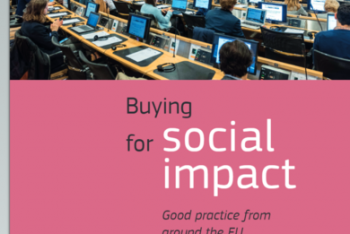Foto: Photo by Monstera
What is social entrepreneurship and what are social enterprises? In this article we briefly explain what is what, starting with the history of social enterprises, general definitions, and, of course, social enterprise roots and eco-system in Latvia.
What is social entrepreneurship?
Defining social entrepreneurship has given rise to many different definitions of the concept.
The Latvian Social Entrepreneurship Association defines it as follows:
Social entrepreneurship is one of the ways to create direct cooperation between everyone in society and to innovatively and effectively find common solutions to social problems that the state and local government cannot solve, but the private sector will not take up because the area is not profitable or is an expensive and time-consuming process to solve.
Simply put, social entrepreneurship is about solving a social problem, not just making a profit.
Social enterprises not only tackle unemployment, but also help to alleviate social problems by channeling the profits of social enterprise towards social problems. Social enterprises and social entrepreneurship is a way of making social impact.
It is important to point out that social entrepreneurship is not the same as charity, nor is social entrepreneurship the same as business in its classical sense. The three formats are distinguished from each other by their underlying motivations, methods and objectives.
Similarly, a distinction must be made between social entrepreneurship and socially responsible entrepreneurship, as the latter concept describes socially responsible business practices such as “improving the working conditions of one’s employees, being environmentally friendly, increasing the quality of goods and services, supporting various charitable projects, etc., but such activities are not recognised as social entrepreneurship. Unlike social enterprise, socially responsible entrepreneurs do not directly create social benefits through their activities or are not set up to solve a problem of social importance. They are for profit and only a part of their profits is directed towards solving various social problems, and most of their activities are carried out through publicity resources, which have a strong link with the desire to persuade as many people as possible to become customers of the company”. [1]
Brief history of social entrepreneurship in Europe and the European Union
Historical perspective of social entrepreneurship is well explained by Jacques Defourny and Marthe Nyssens in their paper “The EMES approach of social enterprise in a comparative perspective”, where they comment on the roots of social enterprise in Europe as follows:
“In Europe, the concept of “social enterprise” as such seems to have first appeared in Italy, where it was promoted through a journal launched in 1990 and entitled Impresa sociale. In the late 1980s indeed, new cooperative-like initiatives had emerged in this country to respond to unmet needs, especially in the field of work integration as well as in the field of personal services. As the existing legislation did not allow associations to develop economic activities, the Italian Parliament passed a law in 1991 creating a new legal form – namely that of “social cooperative” -, which proved to be very well adapted to those pioneering social enterprises.”
Initially, most social enterprises were set up to create jobs for specific groups of people, such as the disabled or the long-term unemployed. Over the last thirty years, the concept has evolved, with the number of social enterprises in Europe now reaching several hundred thousand. Social enterprises not only create jobs for specific groups, but also produce goods and services.
At European Union level, social entrepreneurship became relevant after the Global Financial Crisis, which created the need for new solutions to tackle unemployment and social entrepreneurship.
According to the authors of the study “Latvia on the road to social entrepreneurship”, “at the end of October 2011, the European Commission issued a Communication on the Social Entrepreneurship Initiative, thus demonstrating its willingness to support and promote the development and visibility of social entrepreneurship”. [2]
Social entrepreneurship in Latvia
Social entrepreneurship dates back to 2011, when the non-governmental sector was still talking about Latvia being on the road to social entrepreneurship.
At the end of 2011, the Public Policy Centre PROVIDUS and the Civic Alliance of Latvia started to develop a concept of social entrepreneurship in Latvia.
On 14 October 2014, the Cabinet of Ministers approved the concept “On the Possibilities of Introducing Social Entrepreneurship in Latvia”, which aims to launch a new policy initiative for the development of social entrepreneurship. Thanks to EU funding, the Ministry of Welfare implemented a pilot project “Support for Social Entrepreneurship”, under which social enterprises in Latvia could receive grants to establish or develop social entrepreneurship.
In 2016-2017, PROVIDUS, in cooperation with a number of NGOs and businesses, prepared two methodologies and trained staff of the Ministry of Welfare and the financial institution Altum on how to identify and promote social enterprises in Latvia, as part of the “Support for Social Entrepreneurship” project.
The main objective of the development of the methodology “Social Enterprise Support Instruments and Support Delivery” was to identify an effective solution at national level for further forms and programmes to support social enterprises. The project started to develop a complete and effective support system, offering support directions and solutions for social enterprises, as well as promoting the development and successful implementation of social entrepreneurship in Latvia.
Providus was present during the drafting process, actively participating in and commenting on the draft law “Social Entrepreneurship Law”. For example, on 10 October 2016, PROVIDUS provided an opinion on the text of the draft law and proposed additions and corrections to ensure that the final version of the law meets the best standards for social entrepreneurship.
The Social Enterpreneurship Association of Latvia is established!
In autumn 2015, the Social Enterpreneurship Association of Latvia was founded. Its aim is to promote the development of social entrepreneurship in Latvia.
The organisation was founded by five organisations – Open Society Foundation DOTS, Public Research Centre PROVIDUS, Latvian Samaritans Association, charity shop network “Otra elpa”, social entrepreneurship accelerator “New Door”. These five organisations have done a lot in the field of social entrepreneurship research and actualization, and are themselves pioneers of social entrepreneurship in Latvia, who have proved through their work that social entrepreneurship in Latvia is necessary and possible.
With the founding of the Social Enterpreneurship Association of Latvia, the association became the main promoter of social entrepreneurship in Latvia.
Since its foundation and still today, the Social Enterpreneurship Association of Latvia works in three main directions:
- Advocacy at local, regional and national level.
- Capacity building of members, creating a platform for exchange of experience and knowledge.
- Informing the public about social entrepreneurship.
Even though the social enterprise eco-system in Latvia is rather new, the Social Enterpreneurship Association of Latvia has already more than 100 members — organisations that work in various fields. A full member-list can be found in the association’s homepage.
In 2018, the Social Enterprise Law is adopted in Latvia
After several years of work, the Social Enterprise Law came into force on 1 April 2018 with the aim of creating a favourable environment for social entrepreneurship. Representatives of the Social Enterpreneurship Association of Latvia have been actively involved in the development of the law for three years.
By 5 December 2018, 27 limited liability companies had obtained the status of social enterprise.
In 2019, the Ministry of Welfare granted social enterprise status to 81 limited liability companies, 27 applications were rejected.
In 2020, 67 Limited Liability Companies were granted social enterprise status.
In 2021, the Ministry of Welfare granted social enterprise status to 61 companies.
Throughout this period, since 2018, social enterprises could also apply for and receive government grants to carry out social entrepreneurship.
“At the end of 2021, there are 219 social enterprises in the Social Enterprise Register, 193 of them active. In 2021, the Social Enterprise Commission has reviewed 130 annual activity reports of SUs, of which 117 have been approved, 9 – SU status revoked, 3 – SU status withdrawn, 1 – loss of SU status in process. The Register of Participants (until 01.04.2018) includes 98 social entrepreneurs (LLCs, associations, foundations), 33 of which have received financial support from ALTUM.” [3]
Socially responsible public procurement
Even though the Social Enterprise Law in Latvia has been in power since 2018, it’s not the final goal of organisations affiliated with it, as scaling its social impact in Latvia is one of the goals of Centre for Public Policy PROVIDUS and the Social Enterpreneurship Association of Latvia.
One way to scale this social impact is by promoting responsible social procurement.
In 2020 Ms.Agnese Frīdenberga and Ms.Kristīne Gaigule–Šāvēja mapped the social enterprise ecosystem in Latvia in which social economy enterprises operate, including access to public procurement contracts. Results of this research were published in a pan-European paper “Buying for social impact: Good practice from around the EU”.
In the paper both experts (Frīdenberga and Gaigule-Šāvēja) prepared an overview on situation in Latvia and prepared an information about how social economy organizations can be involved in public procurement procedures, what are existing practice, how EU directive on public procurement is transposed to Latvia legislation, are public buyers aware and ready to include social clauses in public procurement procedures. The research found that there are social enterprises in Latvia, some of them have interest to participate in public procurement procedures, but public buyers do not use social clauses in public procurement procedures.
More detailed overview of the legal background of public procurement structure at national, regional and local level in Latvia in regard to social enterprise can be found in this excerpt from the paper “Buying for social impact: Good practice from around the EU”.–
Municipalities and social enterprises – cooperation and support
“Municipalities have a great opportunity to be both – a cooperation partner of social enterprises and to support the emergence of new social enterprises in the county or city by creating a full-fledged support system for the promotion of social entrepreneurship.”
In the paper “Municipal tools for development of social enterprises in municipalities” published in 2021, PROVIDUS’ senior policy analyst Agnese Frīdenberga outlines 9 ways how municipalities can foster development of social enterprises:
1. Municipality as a contact point.
• Determining the responsible person;
• Directory of social enterprises;
• Networking and meetings with the municipality;
• Mapping of “social entrepreneurs”.
2. Infrastructure and activities for the establishment of and support for social enterprises.
• Ensuring the availability of municipal infrastructure;
• Educational activities;
• Consultations.
3. Providing exposure.
• Active communication about social enterprises;
• Inclusion in informative materials;
• Inclusion / involvement in events organized by the municipality.
4. Grants programs and other financial support programs.
• Grant programs to support social enterprises;
• Specific criteria / additional points for social enterprises in existing grant schemes.
5. Policy planning documents.
• Sustainable development strategy;
• Development program.
6. Delegation of administrative tasks.
• Delegating municipality’s tasks to social enterprises.
7. Work groups and advisory boards.
• Inclusion of representatives of social enterprises in advisory councils;
• Establishment of a working group for the development of social entrepreneurship.
8. Municipality as recipient of services.
• Purchase of goods / services;
• Socially responsible public procurement;
• Preferential agreements.
9. Tax discounts and transfer of property for limited time use or ownership.
• Real estate tax rebate;
• Transfer of property to / from property free of charge.”[4]
[1] https://providus.lv/article_files/2265/original/SU_gala_9nov.pdf?1352889758
[2] Ibid.
[3] https://www.lm.gov.lv/lv/sociala-uznemejdarbiba?utm_source=https%3A%2F%2Fwww.google.com%2F
[4] https://providus.lv/en/raksti/9-ways-how-municipalities-can-foster-development-of-social-enterprises-excerpt-from-report-municipal-tools-for-development-of-social-enterprises-in-municipalities/





